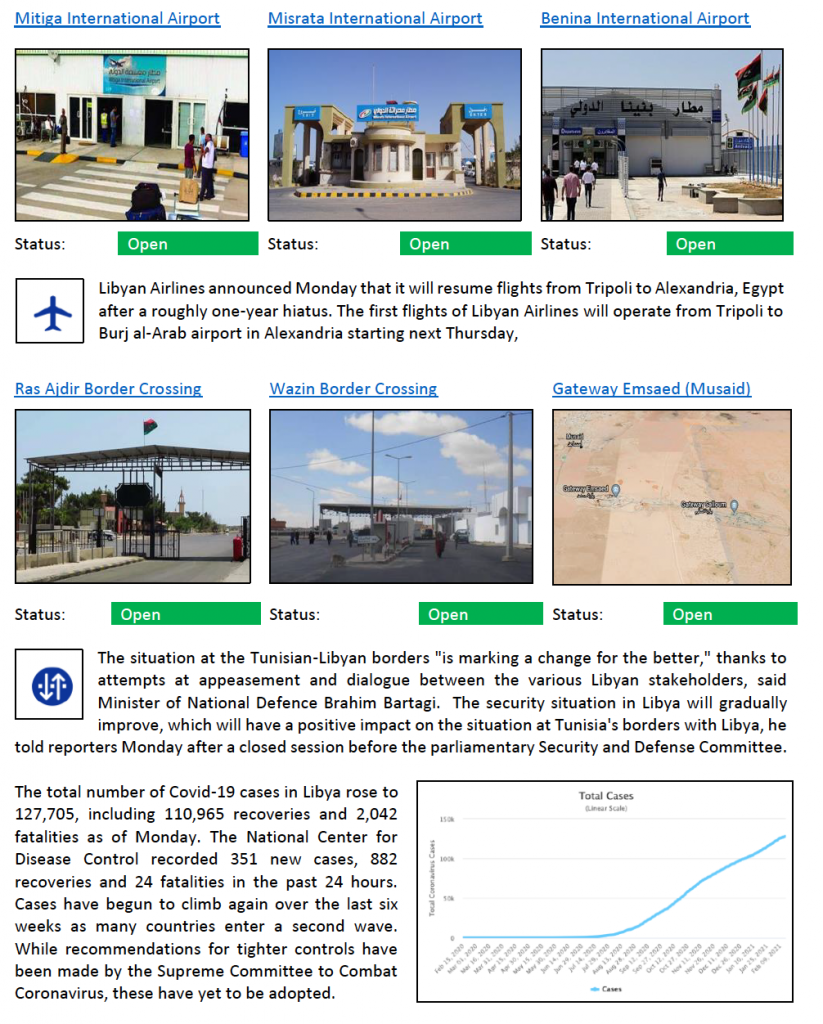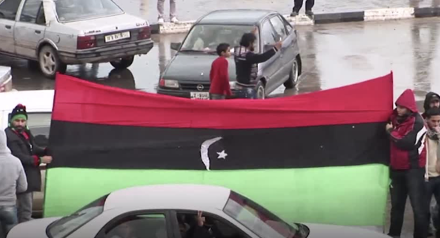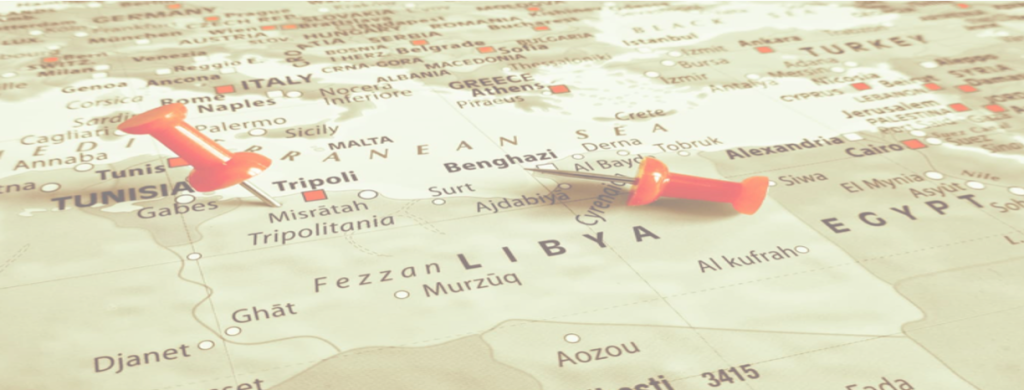
Weekly Highlights
- Op-Ed: Ten years after a revolution, Libya remains torn
- Winners and losers in Libya’s political deal
- GECOL informs consumers to prepare for more outages
- 5 + 5 Joint Military Committee: The exit of mercenaries and foreign fighters from Libya is a must
- More than 1,500 migrants intercepted off Libya and returned
Currency Exchange:
- Bank exchange rate: USD 1 – LYD 4.4715
- Black market exchange rate: USD 1 – LYD 5.14
EXECUTIVE SUMMARY
Op-Ed: Ten years after a revolution, Libya remains torn
It has been ten years since the fate of Libya and its people was altered forever. It is hard to imagine a decade has passed, because as Libyans, we are still in a fighting mode, both figuratively and literally. This anniversary is a reminder of the hopes and aspirations of an open democratic society where all live under a governing system set to provide to its people and believe in its potential and worth. This anniversary is also a reality check of long queues in front of banks, longer queues in front of petrol stations, water shortage, 14-hour power cuts in the gruelling summers of the Sahara Desert, sky high inflation, dangerous triggering rhetoric, militias, kidnapping and casual indiscriminate shelling. LIBYA HERALD
Winners and losers in Libya’s political deal
Libya finally has a prime minister and Presidential Council. Whether this will bring unity and peace to the divided, war-torn country is another matter. Credit for this positive development goes to Stephanie Williams, acting United Nations envoy and head of its Support Mission in Libya (UNSMIL). During the marathon session in Geneva, Switzerland, on Feb. 5, the Libyan Political Dialogue Forum (LPDF) voted 39 to 34 to appoint Abdul Hamid Dbeibah, a businessman turned politician, to be prime minister while appointing little-known diplomat Mohamed Younis Menfi as head of the three-member Presidential Council, replacing the outgoing, dysfunctional nine-member council headed by Fayez al-Sarraj, who has been at the helm since 2015. AL MONITOR
GECOL informs consumers to prepare for more outages
General Electricity Company of Libya (GECOL) has warned consumers to prepare for more outages due to bad weather conditions, which caused a breakdown in the power transmission units west of al-Khums and Tamina district and a loss of 1,225 megawatts. The company told residents the outages may extend to 5 hours due to the damage caused, stressing that work is underway to restart the units as soon as possible. “The 1st, 2nd, and 3rd units at the al-Khums gas station went out of service, which means a deficit of 375 megawatts in the network, while the disruption in the al-Khums emergency station caused a shortfall of 525 megawatts,” the GECOL explained, pointing out that the second gas unit, and the first, second, and third steam unit at the Zawiya station have also been disabled by bad weather. LIBYA OBSERVER
5 + 5 Joint Military Committee: The exit of mercenaries and foreign fighters from Libya is a must
Brigadier General, Al-Fitouri Gribel, a member of the 5 + 5 Military Committee, affirmed that (the mercenaries file will not be tolerated, pledging that the committee will work to remove them from Libya by any means, and that the departure of mercenaries and foreign fighters from Libyan lands is an inevitable necessity. In statement, Grebel said that “the committee is in contact with countries that have mercenaries in Libya about this matter, and that a delegation from the committee will visit these countries in order to push them towards deporting mercenaries of their nationalities. LANA NEWS
More than 1,500 migrants intercepted off Libya and returned
During the past week Libyan coast guards intercepted more than 1,500 Europe-bound migrants, according to a non-governmental organization. UN officials and human rights advocates have denounced the return of migrants to Libya because they face violence and arbitrary detention. The International Rescue Committee (IRC) confirmed Wednesday that around 1,500 people had been picked up from boats off Libya’s western shores within one week. “The Libyan coastguard has conducted several rescue operations from a week ago until (Wednesday) and rescued about 1,500 people,” Adel al-Idrissi from the IRC told the news agency AFP. Libyan authorities said that on Wednesday (February 10) alone, two boats with a total of 240 African migrants on board were intercepted off the port city of Al-Khums. INFOMIGRANTS
USEFUL INFORMATION
List of holidays in Libya 2021
| Date | Day | Name | Type |
| 17 Feb | Wednesday | Libyan Revolution Day | Public Holiday |
| 1 May | Saturday | May Day | Public Holiday |
| 13 May | Thursday | Eid al-Fitr | Public Holiday |
| 14 May | Friday | Eid al-Fitr Holiday | Public Holiday |
| 15 May | Saturday | Eid al-Fitr Holiday | Public Holiday |
| 19 Jul | Monday | Day of Arafah | Public Holiday |
| 20 Jul | Tuesday | Eid al-Adha | Public Holiday |
| 21 Jul | Wednesday | Eid al-Adha | Public Holiday |
| 22 Jul | Thursday | Eid al-Adha | Public Holiday |
| 10 Aug | Tuesday | Muharram | Public Holiday |
| 16 Sep | Thursday | Martyrs’ Day | Public Holiday |
| 19 Oct | Tuesday | The Prophet’s Birthday | Public Holiday |
| 23 Oct | Saturday | Liberation Day | Public Holiday |
| 24 Dec | Friday | Independence Day | Public Holiday |
Exchange rates – Libyan Dinar
According to our most recent information (11th & 15th February 2021) the Libyan Dinar has the following exchange rates.
The exchange rate from your own bank or credit card company will differ somewhat from the exchange rates as mentioned above. Your bank or credit card company might also apply additional international charges.
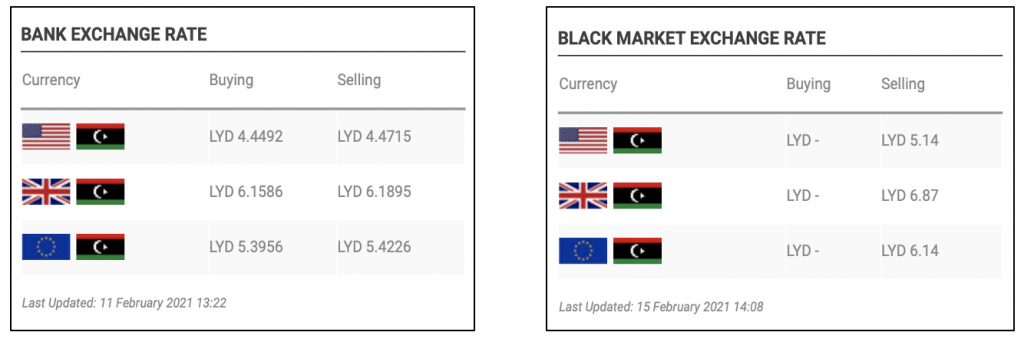
LIBYA SECURITY & RISK LEVELS

Do not travel to Libya due to COVID-19, crime, terrorism, civil unrest, kidnapping, and armed conflict.
Crime levels in Libya remain high, including the threat of kidnapping for ransom. Westerners and U.S. citizens have been targets of these crimes.
Terrorist groups continue plotting attacks in Libya. Violent extremist activity in Libya remains high, and extremist groups have made threats against citizens. Terrorists may attack with little or no warning, targeting tourist locations, hotels, transportation hubs, markets/shopping malls, and government facilities.
Outbreaks of violence between competing armed groups can occur with little warning and have the potential to impact citizens. The capital, Tripoli, and other cities, such as Surman, Al-Jufra, Misrata, Ajdabiya, Benghazi, Sabha, and Dernah, have witnessed fighting among armed groups, as well as terrorist attacks. Hotels and airports frequented by Westerners have been the targets of these attacks. Even demonstrations intended to be peaceful can turn confrontational and escalate into violence.
For the latest advice from the Libyan government, please visit the National Centre of Disease Control (NCDC) webpage at ncdc.org.ly/Ar/
If you decide to travel to Libya:
- Carry proof of citizenship and valid immigration status at all times.
- Avoid demonstrations and crowds.
- Make contingency plans to leave.
- Establish your own personal security plan in coordination with your employer or host organisation or consider consulting with a professional security organization.
- Develop a communication plan with family and/or your employer or host organization.

LIBYA INCIDENT MAPPING: 09 – 16 FEBRUARY 21
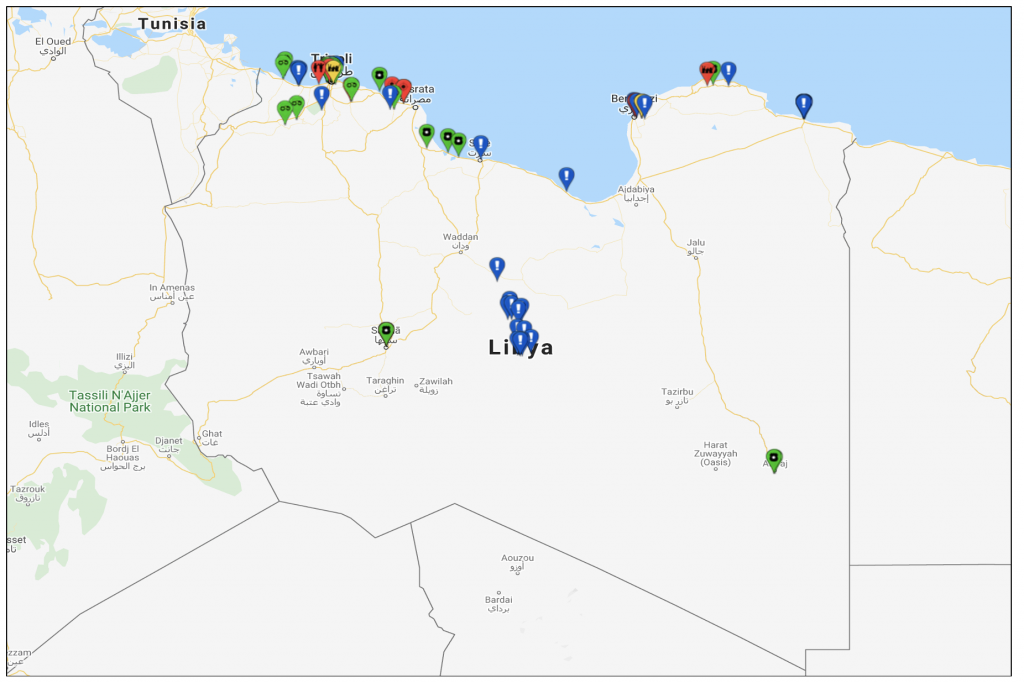
LIBYA – SIGNIFICANT INCIDENTS IN DETAIL
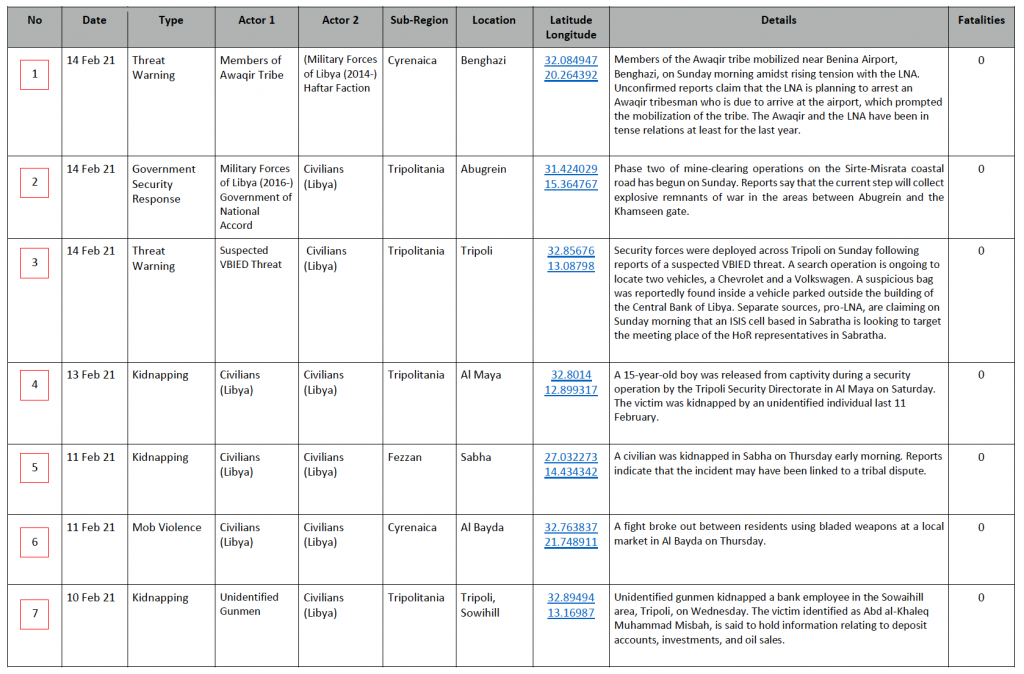
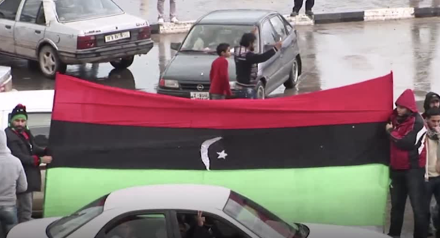
On this Day: Remembering the Libyan Revolution
On 15 February 2011, inspired and buoyed by the uprisings in other Arab countries, especially neighbouring Egypt and Tunisia, Libya’s popular revolution broke out in Benghazi. Hundreds of people gathered outside a government building in the city following the arrest of a young human rights lawyer, Fethi Tarbel. The protesters called for Gaddafi to step down and for the release of political prisoners.
Protests spread quickly to other cities, leading to escalating clashes between security forces and anti-government rebels. Hundreds of people were reported to have been killed by security forces in Benghazi.
Even though demonstrators faced live ammunition fired by Gaddafi’s forces, they took control of Benghazi on 20 February. Other cities in eastern Libya soon followed. Shocked by the brutality of the government response to the demonstrations, a number of senior officials resigned from Gaddafi’s administration. The National Transitional Council (NTC) was formed as an umbrella group to represent the rebels. It was led by defectors from Gaddafi’s government, and was for a time the de facto government of Libya, gaining recognition in western and Arab capitals.
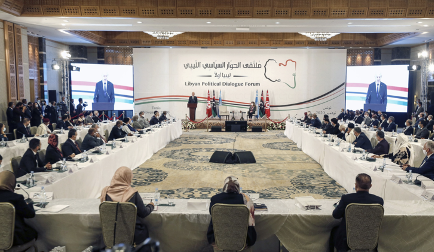
Libya’s interim government: A fragile deal
The United Nations-led Libya Political Dialogue Forum (LPDF) voted to appoint an interim government for Libya on Feb. 5. Members from conflicting parties and the representatives of key groups in Libya had been discussing their country’s political future under the LPDF since the beginning of November 2020.
Acting U.N. envoy Stephanie Williams facilitated the talks with a team’s support from the mission. The 75-member LPDF was formed in the auspices of the U.N. Libya Support Mission (UNSMIL) to end the ongoing civil war in the country and move forward to elections on Dec. 24, 2021.
A surprising list of four names – Mohammed Menfi, the head of the Libyan Presidency Council; Abdul-Hamid Mohammed Dbeibeh, the interim prime minister; Abdallah Hussein al-Lafi, the new deputy head of western Libya, and Moussa al-Koni, the new deputy head of southern Libya – constitute the members of the elected transitional executive authority. The group unexpectedly won by taking 39 of the 73 valid votes.
The interim government is expected to lead Libya to the December 2021 elections.
The chances of stabilization in Libya are grim in the short term due to the country’s structural problems, and both the domestic and international stakeholders have a variety of expectations. Preventing the further escalation of armed conflict and providing essential services such as electricity, water and health services are the primary expectations of the transitional authority.
REGIONAL REPORTED INCIDENT NUMBERS: 09 – 16 FEBRUARY 21
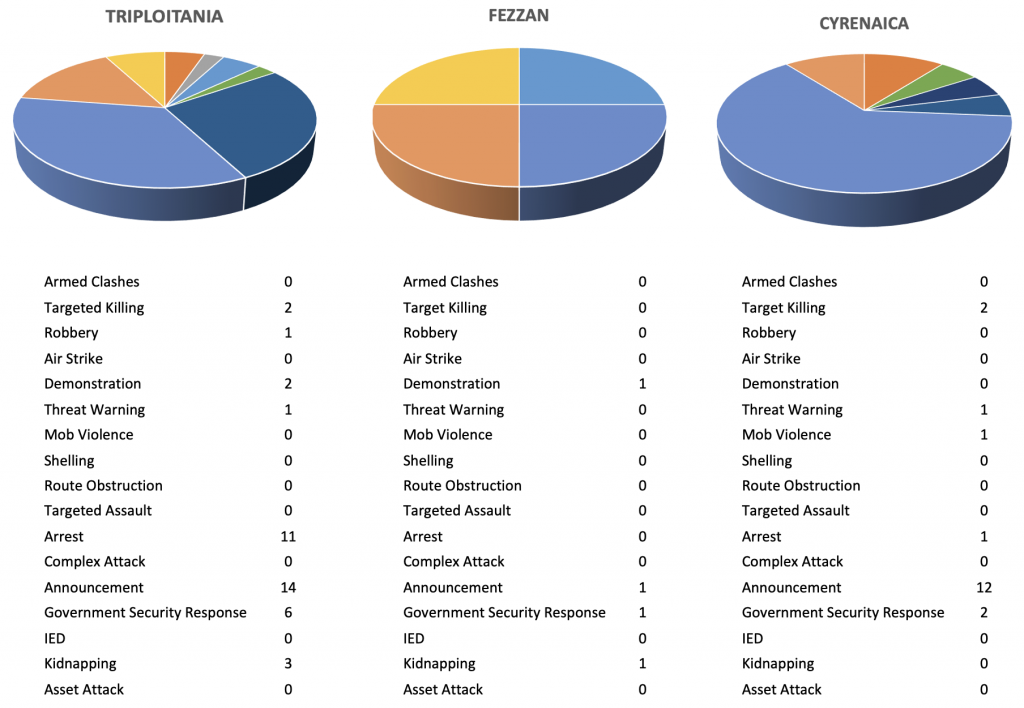
POLITICAL OVERVIEW
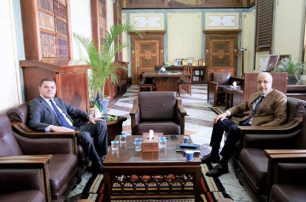
The Prime Minister of the new executive authority elected by the Libyan Political Dialogue Forum under the auspices of UNSMIL, Abdul-Hamid Dbeibah, met Sunday with the Governor of the Central Bank of Libya (CBL), Al-Siddiq Al-Kabir, in Tripoli. CBL said on Facebook that Dbeibah and Al-Kabir had reviewed efforts to ensure financial and monetary stability as well as the unification of state institutions to achieve national goals. Dbeibah said Saturday on Twitter that he was carrying out consultations to form a national unity government and present it in the coming days to the House of Representatives for confidence. LIBYA OBSERVER
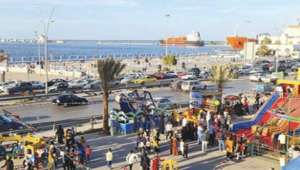
Libyan National Army (LNA) commander Khalifa Haftar has offered his backing for a peace process that seeks to end a decade of chaos, after meeting the head of a new transitional presidential council. He met with Mohammed Younes Menfi, a former diplomat who also comes from eastern Libya, and who was selected last week in an UN-backed process to head the three-member presidency council. Haftar offered “the support of the armed forces for the peace process, to defend democracy and the peaceful transfer of power,” a statement from his office read. The meeting took place as President Recep Tayyip Erdogan’s spokesperson Ibrahim Kalin said Turkish troops stationed in Libya will remain there as long as a bilateral military agreement between Ankara and Tripoli is active. AAWSAT
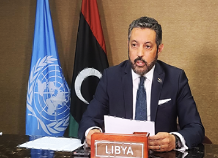
Libya’s envoy to the United Nations, Al-Taher El Sonni, announced that the United Nations Security Council’s Sanctions Committee rejected Belgium’s request to seize 49 million euros worth of Libyan frozen assets. The Belgian governments wanted to seize these assets in the name of Global Sustainable Development Trust (GSDT), an NGO owned by Belgian Prince Laurent. Through its finance ministry, the Belgian government announced last month that it would ask the UN’s sanctions committee to unfreeze some of Libya’s assets in Belgian banks to get their dues, valued at 49 million euros. El Sonni has stated that the Belgian authorities will not be able to size millions of euros worth of Libya’s frozen assets, advising the Belgians to reconsider their actions as it will not happen under any circumstances. LIBYAN EXPRESS
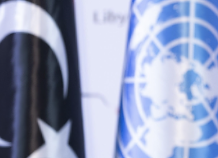
UN Special Envoy for Libya spoken with actors in the war-torn country Friday and thanked them “for their active participation in the Libyan Political Dialogue Forum.” UN’s Support Mission in Libya (UNSMIL) said in a statement that in the past two days, Jan Kubis spoke with President of the High Council of State Khaled al-Meshri, Deputy President of the Presidency Council Ahmed Maetig and Interior Minister Fathi Bashaga and “acknowledged their work to achieve progress in political, economic, and security files.” AA
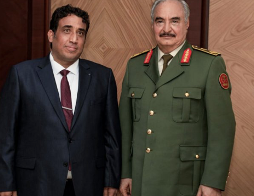
Libya’s newly selected Presidency Council head, Mohamed Menfi (Manfi / Menefi), has arrived in Libya for the first time since he was selected by the 74 member Libyan Political Dialogue Forum (LPDF) in Geneva last Friday 5 February. The LPDF membership was selected by UNSMIL to represent all of Libya. This comes after the country’s parliament, the House of Representatives (HoR), has been in a state of political paralysis since 2014, unable to implement its constitutional duty of passing the draft constitution and conducting constitutionally based general elections to take the country out of its interim state. LIBYA HERALD
AIRPORTS & BORDERS STATUS
